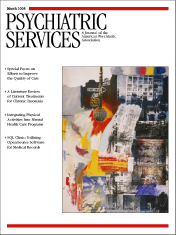In light of findings that the course of schizophrenia is, in most instances, considerably more favorable than had been previously thought, a consensus has emerged that the appropriate goals for treatment are recovery and reintegration. Therefore, hospital readmission rates and lengths of community tenure can no longer suffice as indexes of appropriate outpatient care. Nevertheless, there has been tremendous resistance in the field to accepting and applying more appropriate indexes. For example, providers argue that they are only partially responsible for the results they achieve.
What indexes might be more appropriate? Peer-advocates are fairly consistent in telling us—and who could argue with these goals?—that their colleagues seek five prerequisites for successful community tenure: adequate housing, access to transportation, a useful function, a social network, and an intimate relationship. To these, an administrator might add two more: access to adequate general health care and as little involvement as possible with the criminal justice system.
To increase the likelihood of achieving these goals, funding will be required to enhance the currently inadequate salary structure of community mental health staff. Current rates of turnover only perpetuate the lack of continuity of care from staff who are capable of providing skilled, individually tailored interventions. Training and maintaining such a workforce will also require greater funding. Furthermore, providers will need help to support the integration of continuous improvement into quality of care.
However, it is axiomatic that the public mental health system consistently makes as strong a case for the need for its services as it does a weak one for their effectiveness. As long as no widely accepted indexes of the results of outpatient care exist, persons making budgets and providing funds can easily ignore funding requests from providers who can make only general claims for the value of their services. A convincing case for funding will have to integrate service evaluation into service provision, modify services as new evidence emerges for more effective practices, and accept compensation for results, rather than for services.
State mental health authorities, organized psychiatry, hospital associations, other organized providers, and peer-advocates will all need to come together to participate in the process of selecting the appropriate indexes, if there is to be any hope of overcoming the resistance noted above. The funding structure is "the ocean through which the marine life of community behavioral health care must swim."

